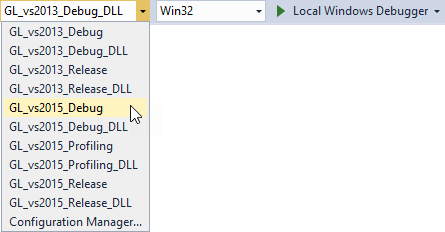onProjectLoaded() function add the event handler for the Back button.virtual void onProjectLoaded() KZ_OVERRIDE
{
...
// Add the handler for the Back button.
m_backButton->addMessageHandler(Button3D::PressedMessage, bind(&ProgrammerTutorialApplication::onBackButtonClicked, this, placeholders::_1));
}ProgrammerTutorialApplication class after the onListBoxItemSelected() function implement the event handler for the Back button click message.When the user clicks the Back button, the event handler runs the camera and widget highlight animation in reverse order, and hides the Widget Description Layer node.
Besides being a container for the description panel, the Widget Description Layer node also prevents interaction with the Widget Grid List Box node while it is visible.
You first run the animation, which sets the node visibility to
false when the animation is finished. Next you make the node transparent by setting its opacity to 0.0f. The Widget Description Layer node is hidden, but remains visible to block user input until the animation is finished.class ProgrammerTutorialApplication : public ExampleApplication
{
...
// The handler for the Button.Pressed message from the Back button.
// Moves the selected list box item back to its position.
void onBackButtonClicked(ButtonConcept::PressedMessageArguments& /*messageArguments*/)
{
// De-select the previously selected list box item.
m_widgetList->selectItem(nullopt);
// Remove old playbacks to reset the values.
removePlaybacks();
// Start the animation for the camera in reverse direction.
PropertyAnimationTimelineSharedPtr cameraTimeline = PropertyAnimationTimeline::create(getDomain(), ".", Node3D::RenderTransformationProperty, m_cameraAnimation);
cameraTimeline->setDirectionBehavior(Timeline::DirectionBehaviorReverse);
SceneGraphTimelinePlaybackContext cameraContext(*m_camera);
m_cameraPlayback = cameraTimeline->createPlayback(cameraContext);
getDomain()->getRootTimelineClock()->addTimelinePlayback(m_cameraPlayback);
// Start the animation for the selected item in reverse direction.
PropertyAnimationTimelineSharedPtr selectedItemTimeline = PropertyAnimationTimeline::create(getDomain(), ".", Node3D::LayoutTransformationProperty, m_selectedItemAnimation);
selectedItemTimeline->setDirectionBehavior(Timeline::DirectionBehaviorReverse);
SceneGraphTimelinePlaybackContext selectedItemContext(*m_selectedItem);
m_widgetHighlightPlayback = selectedItemTimeline->createPlayback(selectedItemContext);
getDomain()->getRootTimelineClock()->addTimelinePlayback(m_widgetHighlightPlayback);
// Start the animation to hide the Widget Description Layer.
PropertyAnimationTimelineSharedPtr widgetDescriptionVisibilityTimeline = PropertyAnimationTimeline::create(getDomain(), ".", Node::VisibleProperty, m_widgetDescriptionVisibilityAnimation);
SceneGraphTimelinePlaybackContext listBoxContext(*m_widgetDescriptionNode);
m_widgetDescriptionVisibilityPlayback = widgetDescriptionVisibilityTimeline->createPlayback(listBoxContext);
getDomain()->getRootTimelineClock()->addTimelinePlayback(m_widgetDescriptionVisibilityPlayback);
// Make the Widget Description Layer transparent.
m_widgetDescriptionNode->setProperty(Node::OpacityProperty, 0.0f);
}
};void onListBoxItemSelected(ListBoxConcept::itemSelectedMessageArguments& messageArguments)
{
...
if (selectedItemIndex)
{
...
// Show the widget description by setting the Widget Description Layer visible.
if (m_widgetDescriptionVisibilityPlayback)
{
...
}
...
// Make the Widget Description Layer opaque.
m_widgetDescriptionNode->setProperty(Node::OpacityProperty, 1.0f);
}
}onBackButtonClicked() function add a function which removes the old playbacks from the timeline clock to reset the camera values: // Remove old playbacks from the timeline clock.
void removePlaybacks()
{
TimelineClockSharedPtr timelineClock = getDomain()->getRootTimelineClock();
if (m_cameraPlayback)
{
timelineClock->removeTimelinePlayback(*m_cameraPlayback);
m_cameraPlayback.reset();
}
if (m_widgetHighlightPlayback)
{
timelineClock->removeTimelinePlayback(*m_widgetHighlightPlayback);
m_widgetHighlightPlayback.reset();
}
if (m_backButtonEnablePlayback)
{
timelineClock->removeTimelinePlayback(*m_backButtonEnablePlayback);
m_backButtonEnablePlayback.reset();
}
if (m_widgetDescriptionVisibilityPlayback)
{
timelineClock->removeTimelinePlayback(*m_widgetDescriptionVisibilityPlayback);
m_widgetDescriptionVisibilityPlayback.reset();
}
}For example, if you are still developing your application, select the GL_vs2015_Debug configuration. If you want to create a production version of your Kanzi application, select one of the available release configurations.

When you click the Back button in the Widget Description Layer node, the application plays the highlight animation in reverse and initiates the animation that brings the Camera node back to show the entire Widget Grid List Box. Note that the functionality of the Buy button is not covered in this tutorial.
